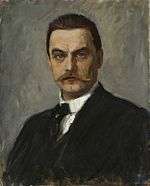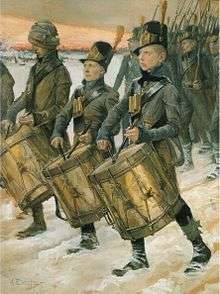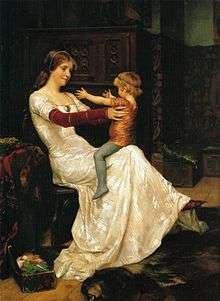Albert Edelfelt
| Albert Edelfelt | |
|---|---|
|
Self portrait (ca. 1887–90) | |
| Born |
Albert Gustaf Aristides Edelfelt 1854 Porvoo, Finland |
| Died | 18 August 1905 |
| Nationality | Finland |
| Occupation | painter |
Albert Gustaf Aristides Edelfelt (21 July 1854 – 18 August 1905) was a Finnish painter.[1]
Biography
He was born in Porvoo, son of Carl Albert Edelfelt, an architect, and Alexandra Edelfelt, née Brandt. His parents were Swedish-speaking Finns. He began his formal studies of art in 1869 at the Drawing School of the Finnish Art Society, and continued as a student of Adolf von Becker (1871–73). He studied history painting at the Antwerp Academy of Art (1873–74) before becoming a pupil of Jean-Léon Gérôme at the École Nationale des Beaux-Arts in Paris (1874–78). In Paris he shared a studio with the American, Julian Alden Weir, who introduced him to John Singer Sargent. Later he studied at Saint Petersburg (1881–82). He married Baroness (friherinnan) Ellan de la Chapelle in 1888, and they had one child.[2]
Career

Edelfelt was one of the first Finnish artists to achieve international fame. He enjoyed considerable success in Paris and was one of the founders of the Realist art movement in Finland.
He influenced several younger Finnish painters and helped fellow Finnish artists such as Akseli Gallen-Kallela and Gunnar Berndtson to make their breakthrough in Paris. Among his students was Léon Bakst. The painting of Louis Pasteur won him the Legion of Honour in 1886 at the exhibition at the Paris Salon.[3]
Edelfelt admired the poet Johan Ludvig Runeberg, who was a friend of the family. The company of Runeberg had a lasting impact on Edelfelt, who from time to time turned to scenes from Finnish history in his paintings. Edelfelt went on to illustrate Runeberg's epic poem The Tales of Ensign Stål. Albert Edelfelt was selected as the main motif in a Finnish commemorative coin celebrating the 150th anniversary of his birth, the €100 Albert Edelfelt and painting commemorative coin, minted in 2004. The reverse shows an embossed face of the artist.[4]
Notable paintings

- Queen Blanka (1877)
- Duke Karl Insulting the Corpse of Klaus Fleming (1878)
- A Child's Funeral (1879)
- Under the Birches (1881)
- Virginie (1883)
- At the sea (1883)
- Boys on the Shore (1884)
- Portrait of Louis Pasteur (1885)[5]
- Women of Ruokolahti on the Church Hill (1887)
- The Luxembourg Garden (1887)
- Christ and Mataleena (1890)
- Porilaisten marssi (1890)
- Copenhagen (1890)
- Two women with laundry (1893)
- Portrait of Nicholas II of Russia (1896)
- Portrait of Aino Ackté (1901)
- Inauguration of the Academy of Turku (1904)
Gallery
- Albert Edelfelt's works
-
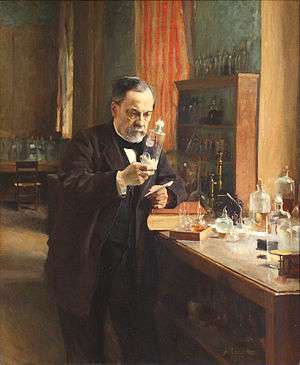
Portrait of Louis Pasteur
-
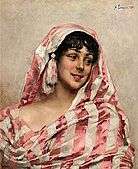
Portrait of young woman
-
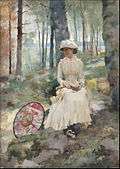
Under the Birches
-
.jpg)
Two woman with laundry
-
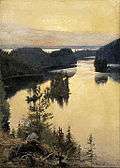
Kaukola Ridge at Sunset
-
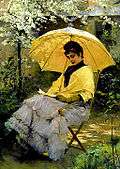
Woman and Parasol
-

Summer
-

-

Copenhagen.
-

Duke Karl Insulting the Corpse of Klaus Fleming
-

The girls in the boat
-
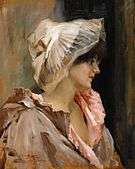
Parisian lady in a Peignoir
-
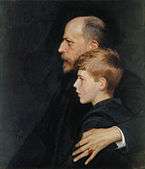
Pietro and Mario Krohn
-
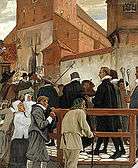
Inauguration of the Academy of Turku Part 1
-
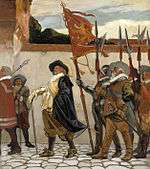
Inauguration of the Academy of Turku Part 2
-
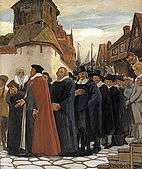
Inauguration of the Academy of Turku Part 3
References
- ↑ "Albert Edelfelt". artrenewal.org. Retrieved April 2, 2015.
- ↑ "Albert Edelfelt, master of plein air". finland.fi. Retrieved April 2, 2015.
- ↑ "Louis Pasteur Albert Edelfelt". musee-orsay.fr. Retrieved April 2, 2015.
- ↑ "-Painters I should have known about". articlesandtexticles.co.uk. Retrieved April 2, 2015.
- ↑ "Louis Pasteur Albert Edelfelt". musee-orsay.fr. Retrieved April 2, 2015.
External links
| Wikimedia Commons has media related to Albert Edelfelt. |
- (English) View some of his pictures (VaasaPages.com)
- (English) Albert Edelfelt Studio Museum (Artist's Studio Museum Network)
